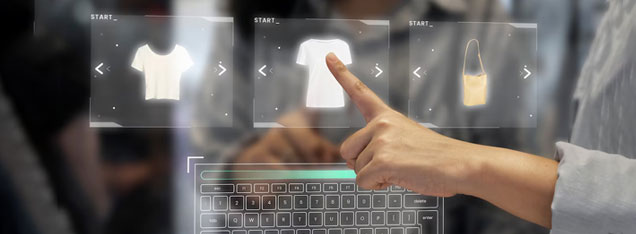Traditional retail involves the sale of goods directly to consumers through physical storefronts, malls, and brick-and-mortar establishments. While this model has been the cornerstone of retail for centuries, it has faced increasing competition from the rise of e-commerce.
E-commerce, or electronic commerce, has revolutionized the way consumers shop and businesses sell their products. It involves the buying and selling of goods and services over the internet, eliminating the need for physical storefronts and enabling transactions to occur anytime, anywhere.
E-commerce has experienced exponential growth over the past two decades, driven by advancements in technology, changing consumer behaviors, and the convenience of online shopping. Retailers have capitalized on this trend by investing in e-commerce platforms, digital marketing, and omnichannel strategies to reach customers across various online channels.
E-commerce has transcended geographical boundaries, allowing retailers to expand their reach beyond local markets and tap into a global customer base. With the click of a button, consumers can purchase products from anywhere in the world, opening up new opportunities for businesses to scale and thrive in the digital economy.
Omnichannel retailing integrates online and offline channels to provide a seamless shopping experience for consumers. Retailers leverage multiple touchpoints, including websites, mobile apps, social media, and physical stores, to engage customers at every stage of the purchasing journey.
Mobile commerce, or m-commerce, has emerged as a dominant force in retail, driven by the widespread adoption of smartphones and mobile devices. Consumers increasingly use mobile devices to browse, shop, and make purchases, prompting retailers to optimize their websites and apps for mobile compatibility and user experience.
Artificial intelligence (AI) is poised to revolutionize retail and e-commerce by enabling personalized shopping experiences, predictive analytics, and targeted marketing campaigns. AI-powered chatbots, recommendation engines, and virtual assistants enhance customer engagement and drive sales by delivering relevant product recommendations and personalized content.
Augmented reality (AR) and virtual reality (VR) technologies are transforming the way consumers interact with products and brands online. Retailers are leveraging AR and VR to create immersive shopping experiences, visualize products in real-world settings, and offer virtual try-on experiences, enhancing customer engagement and reducing return rates.

The Retail & E-commerce industry is undergoing rapid digital transformation, driven by changing consumer behaviors, technological advancements, and market dynamics. However, amidst this evolution, businesses face a myriad of IT development challenges that require innovative solutions and strategic approaches to overcome. Let's delve into some of the key challenges faced by the Retail & E-commerce sector in IT development.

Retail & E-commerce businesses often experience fluctuations in website traffic and transaction volumes, especially during peak seasons or promotional events. Scaling infrastructure and systems to handle sudden spikes in demand while maintaining performance and reliability can be challenging.
Security breaches, data theft, and fraudulent activities are significant concerns for Retail & E-commerce businesses, given the sensitive nature of customer data and financial transactions. Protecting against cyber threats and ensuring data security and privacy are paramount.


Delivering a seamless omnichannel shopping experience across multiple touchpoints, including online stores, mobile apps, social media platforms, and brick-and-mortar stores, requires integration and synchronization of data, inventory, and customer interactions.
Retail & E-commerce businesses must comply with a myriad of regulatory requirements, including consumer protection laws, data privacy regulations (e.g., GDPR, CCPA), and payment card industry (PCI) standards. Ensuring compliance with these regulations can be complex and resource-intensive.


Delivering exceptional customer experiences that differentiate Retail & E-commerce businesses from competitors requires understanding and addressing customer needs, preferences, and pain points across all touchpoints and interactions.
In today's digital age, Retail & E-commerce businesses face fierce competition and rapidly evolving consumer demands. To stay ahead in this dynamic landscape, companies need innovative solutions that enhance customer experiences, streamline operations, and drive revenue growth. Maxaix specializes in delivering tailored technology solutions that empower Retail & E-commerce businesses to achieve their goals and thrive in the digital marketplace.

Maxaix develops custom E-commerce platforms tailored to the unique needs and objectives of Retail businesses. Our solutions offer:

With the rise of mobile shopping, Maxaix creates mobile commerce solutions that enable Retailers to engage customers on-the-go. Our mobile commerce solutions feature:

Efficient inventory management is essential for Retail & E-commerce businesses. Maxaix develops inventory management systems that offer:

Maxaix helps Retailers deliver seamless omnichannel experiences that bridge the gap between online and offline shopping. Our omnichannel solutions enable:

Data-driven decision-making is crucial for Retail & E-commerce success. Maxaix provides analytics solutions that offer:
At Maxaix, we understand the unique challenges and opportunities presented by the Retail & E-commerce industry. Our development work process is designed to deliver innovative, scalable, and customer-centric solutions that empower retailers and e-commerce businesses to succeed in today's competitive market. Let's delve into the key stages of our development process.


